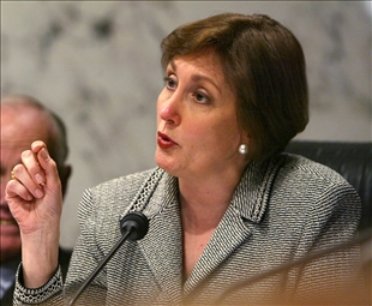Archives
November 12, 2008
Recycling Failed Officials
Remember Jamie Gorelick of Wall of Separation fame, i.e., the Wall that prevented the FBI from sharing information with the CIA, leaving us blind pre-9/11? Well, turns out she also also served as vice chair of Fannie Mae, and received $26 million for it.
Now, she may be back, except this time as attorney general (see below).
Looks like two colossal failures get you a cabinet position in the new Administration.
Yep, that "CHANGE" we were promised, is starting to look mighty familiar....
IBD Editorials | November 11, 2008
Another Brick In 'The Wall'?
By Investor's Business Daily
Transition: Jamie Gorelick may be back, this time as attorney general. It was her "wall of separation" that left us blind pre-9/11. And let's not forget her admirable service at Fannie Mae.

Gorelick makes a point as a member of the 9/11 Commission in 2004.
Not many people can claim to have been at the center of arguably the greatest financial disaster and greatest national security disaster in American history. But Gorelick, said to be on the short list for attorney general by the New York Times, can. Surely that qualifies her for further government service.
Gorelick earned an estimated $26 million serving as vice chair of Fannie Mae from 1998 to 2003. In 1998, according to the Washington Post , Gorelick received a bonus of $779,625, despite a scandal in which employees falsified signatures on accounting transactions to manipulate books to meet 1998 earning targets.
In 2003, she got a "Friends of Angelo" sweetheart mortgage deal from Countrywide Financial for almost $1 million. Her $960,000 mortgage refinancing in 2003 was handled through a program reserved for influential figures and friends of Countrywide's chief executive at the time, Angelo Mozilo.
Countrywide's loans on preferential terms to influential figures are the subject of a federal grand jury investigation in Los Angeles, according to people involved in the inquiry. So Gorelick is in fact under investigation by the department she might soon be running.
On March 25, 2002, BusinessWeek quoted Gorelick as saying: "We believe we are managed safely. Fannie Mae is among the handful of top-quality institutions." One year later, government regulators accused Fannie Mae of improper accounting to the tune of $9 billion in unrecorded losses. This keen financial oversight set the stage for the financial meltdown to follow.
Before Fannie Mae, Gorelick was deputy attorney general in the Clinton Justice Department and architect of the policy that established a wall between intelligence and law enforcement, making "connecting the dots" before 9/11 a virtual impossibility.
Gorelick was the author of a 1995 memo that helped establish what former Attorney General John Ashcroft testified was the "single greatest structural cause" for Sept. 11, which was "the wall that segregated criminal investigators and intelligence agents."
"Government erected this wall," Ashcroft said. "Government buttressed this wall. And before Sept. 11, government was blinded by this wall." Gorelick later was a member of the 9/11 Commission, a participant in the very events being investigated. At the commission hearings, she pummeled Secretary of State Condoleezza Rice, not with questions but with accusations of malfeasance, asking Rice why her office failed to "connect the dots."
Gorelick made the accusations knowing that she herself issued the memo ordering the FBI to erect a legal wall between itself and the CIA, preventing them from sharing information, making it impossible to collect the dots, much less connect them. She should have been a witness, not a panel member.
Manhattan U.S. Attorney Mary Jo White, who in 1998 brought an indictment against bin Laden and a deputy, Mohammed Atef, for the bombings of the U.S. embassies in Kenya and Tanzania, wrote two scathing memos to Attorney General Janet Reno on the wall Gorelick built with Reno's approval.
On June 13, 1995, White wrote Reno: "The most effective way to combat terrorism is with as few labels and walls as possible so that whenever permissible, the right and left hands are communicating."
According to a New York Post report, White was so upset after Reno and Gorelick refused to tear down Gorelick's wall barring information-sharing between intelligence and law enforcement that she wrote a second, still-secret memo, saying their wall hindered law enforcement and could cost lives.
In this time of financial crisis and war on terror, it would be more than a little ironic if an old Clinton crony, someone who played a detrimental role in both, would be rewarded again with a key role in government. Maybe it's true that the more things "change" the more they remain the same.
Original article here.
Log In »
Notable Quotables
"Mr. Netanyahu is one of the most media-savvy politicians on the planet. On Friday he appeared live via video link on 'Real Time with Bill Maher,' taking the host’s alternately sardonic and serious line of questioning with gazelle-like alacrity."
~ Anthony Grant, jourrnalist who has written for many major newspapers and worked in television at Paris and Tel Aviv, interviewing former PM Benjamin Netanyahu on Monday, at the outset of Mr. Netanyahu's new book (more here).


